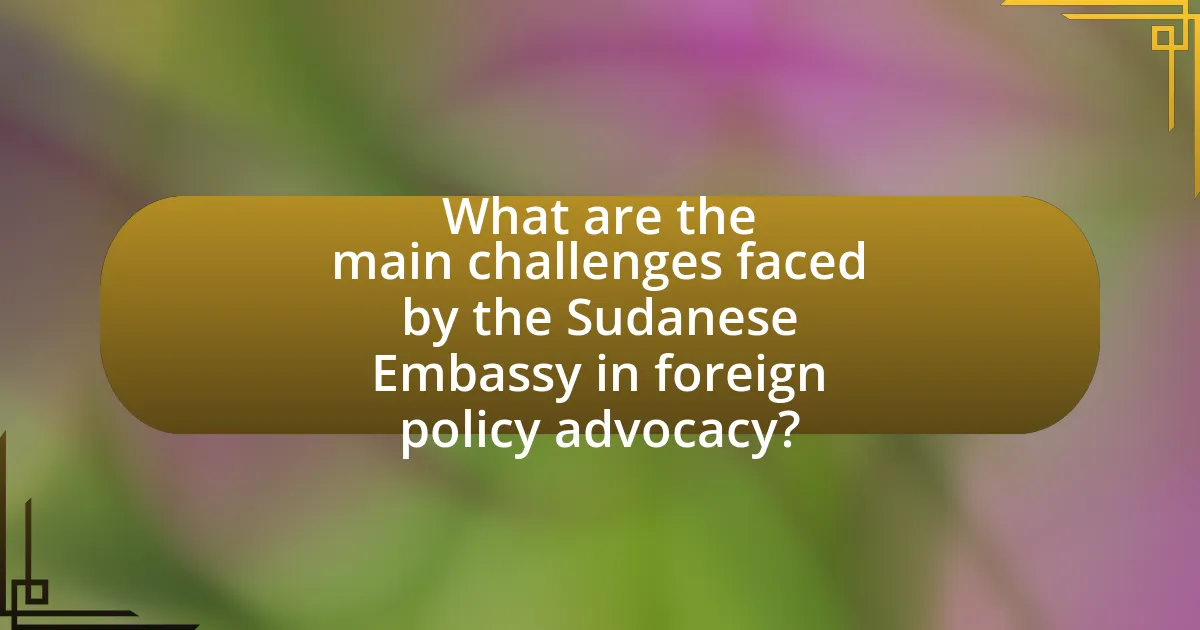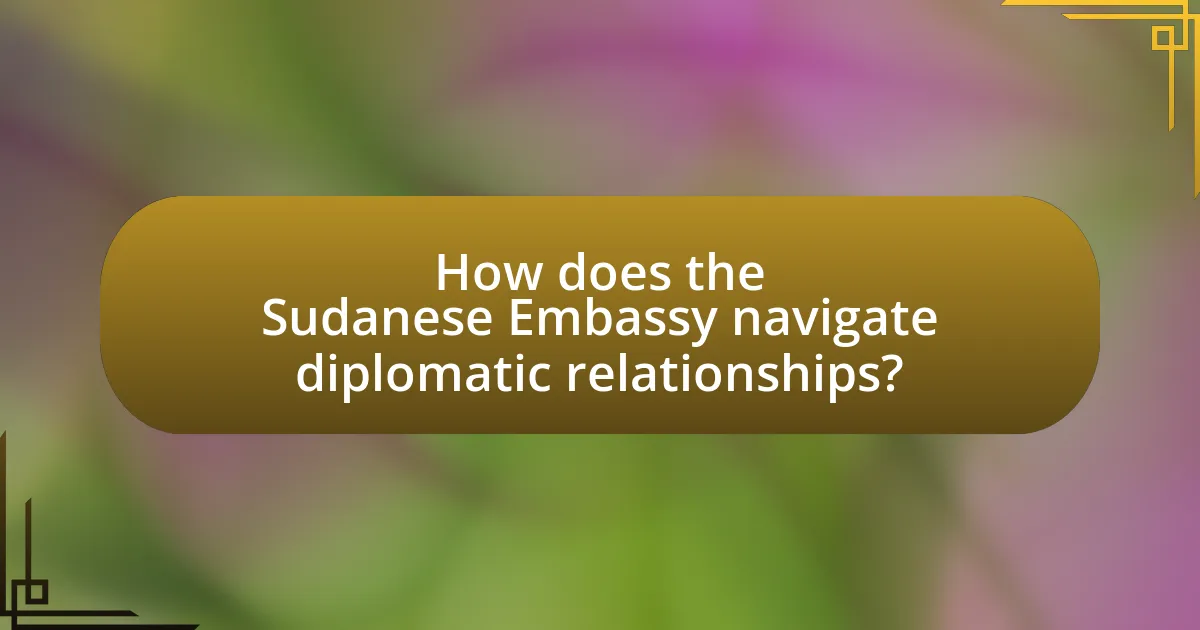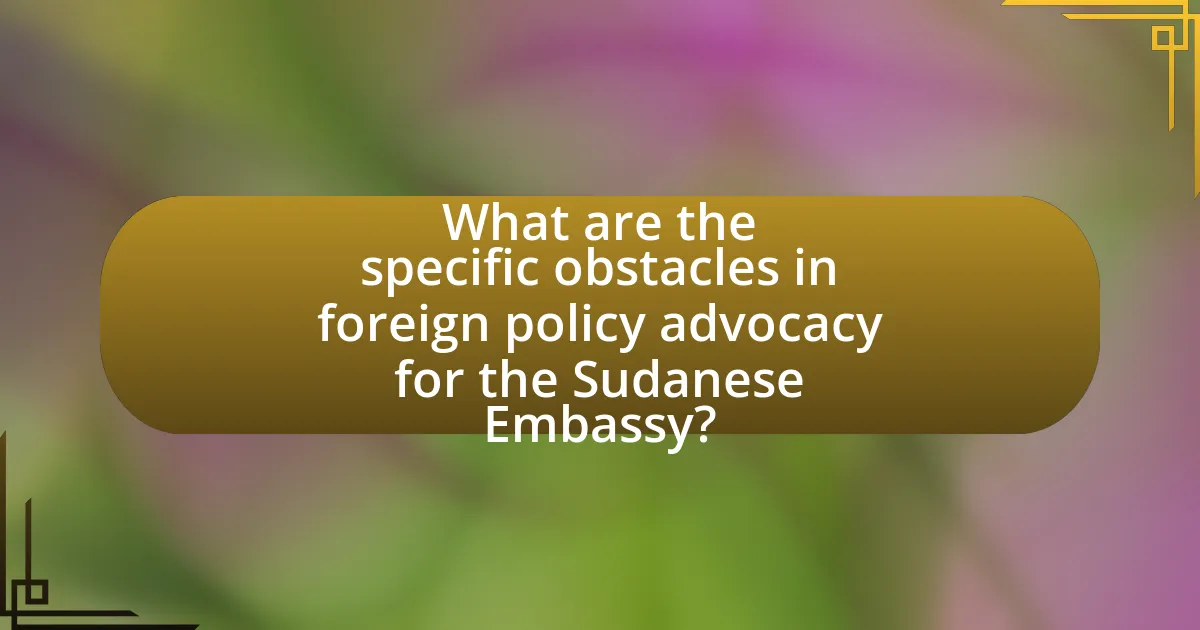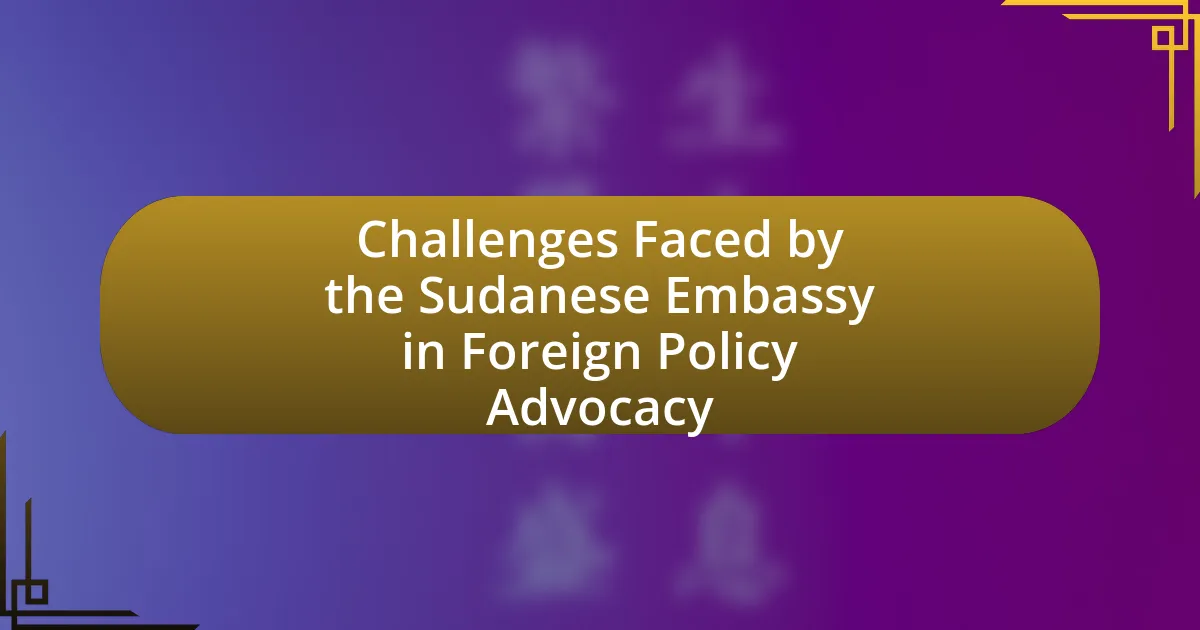The Sudanese Embassy faces significant challenges in foreign policy advocacy, primarily due to limited diplomatic resources, a complex geopolitical landscape, and historical tensions with other nations. Internal political dynamics, particularly following the 2019 revolution, further complicate its efforts, as instability and competing factions hinder consistent representation. External pressures, such as international perception and legal constraints, also impact the embassy’s operations and effectiveness. The article explores these challenges in detail, examining how they shape the embassy’s diplomatic strategies, conflict resolution mechanisms, and overall advocacy initiatives on the global stage.

What are the main challenges faced by the Sudanese Embassy in foreign policy advocacy?
The main challenges faced by the Sudanese Embassy in foreign policy advocacy include limited diplomatic resources, a complex geopolitical landscape, and historical tensions with other nations. Limited diplomatic resources hinder the embassy’s ability to effectively engage with foreign governments and international organizations. The complex geopolitical landscape, characterized by regional conflicts and shifting alliances, complicates Sudan’s foreign relations. Additionally, historical tensions, particularly related to issues such as human rights and governance, create obstacles in building trust and fostering cooperation with other countries. These factors collectively impede the embassy’s efforts to advocate for Sudan’s interests on the global stage.
How do political dynamics in Sudan impact the embassy’s advocacy efforts?
Political dynamics in Sudan significantly hinder the embassy’s advocacy efforts by creating an unstable environment that complicates diplomatic relations. The ongoing conflict and power struggles among various factions, including military and civilian groups, lead to inconsistent policies and a lack of unified representation, which undermines the embassy’s ability to effectively communicate Sudan’s interests abroad. For instance, the 2019 ousting of President Omar al-Bashir resulted in a transitional government that has faced challenges in gaining international recognition and support, affecting the embassy’s capacity to advocate for Sudanese issues on the global stage.
What internal political factors influence the Sudanese Embassy’s foreign policy?
The internal political factors that influence the Sudanese Embassy’s foreign policy include the prevailing government structure, political stability, and the influence of various political factions. The Sudanese government, characterized by a complex power-sharing arrangement, directly impacts the embassy’s diplomatic strategies and priorities. For instance, the transitional government formed after the ousting of Omar al-Bashir in 2019 has led to shifts in foreign policy focus, emphasizing international relations and economic partnerships. Additionally, the presence of competing political groups, such as military factions and civilian political parties, creates a dynamic environment that affects decision-making processes within the embassy. These factors collectively shape the Sudanese Embassy’s approach to foreign policy, reflecting the internal political landscape and its implications for international engagement.
How do external political pressures affect the embassy’s operations?
External political pressures significantly impact the embassy’s operations by influencing diplomatic strategies and resource allocation. For instance, when a host country experiences political instability or shifts in foreign policy, the embassy may need to adapt its communication and engagement tactics to align with the changing landscape. This can lead to prioritizing certain diplomatic initiatives over others, as seen during the Arab Spring, where many embassies had to reassess their roles and focus on crisis management and support for local populations. Additionally, external pressures can affect the embassy’s ability to advocate for its home country’s interests, as competing geopolitical interests may limit its influence and operational effectiveness.
What role does international perception play in the embassy’s advocacy?
International perception significantly influences the embassy’s advocacy by shaping how its messages and initiatives are received globally. A positive international perception can enhance the embassy’s credibility, facilitating stronger diplomatic relationships and support for its foreign policy objectives. For instance, when the Sudanese Embassy effectively communicates its commitment to human rights and democratic reforms, it can garner favorable responses from international organizations and foreign governments, which may lead to increased aid or investment. Conversely, negative perceptions can hinder advocacy efforts, as seen when Sudan faced sanctions due to past human rights violations, limiting the embassy’s ability to promote its interests abroad. Thus, the embassy’s advocacy is closely tied to how it is perceived on the international stage, impacting its effectiveness in achieving foreign policy goals.
How does the historical context of Sudan shape its diplomatic relations?
The historical context of Sudan significantly shapes its diplomatic relations through a legacy of colonialism, civil conflict, and geopolitical positioning. Sudan’s colonial past, marked by British-Egyptian rule, established a framework of external influence that continues to affect its international interactions. The prolonged civil wars, particularly between the north and south, have led to a fragmented national identity, complicating diplomatic efforts and alliances. Additionally, Sudan’s strategic location in the Horn of Africa and its resources, such as oil, have made it a focal point for foreign interests, influencing its relationships with countries like China and the United States. These historical factors create a complex landscape where Sudan navigates its foreign policy amidst ongoing internal challenges and external pressures.
What are the implications of Sudan’s image on its foreign policy initiatives?
Sudan’s image significantly impacts its foreign policy initiatives by shaping international perceptions and influencing diplomatic relations. A negative image, often associated with past conflicts, human rights violations, and political instability, can lead to reduced foreign investment and limited partnerships with other nations. For instance, Sudan’s designation as a state sponsor of terrorism until 2020 hindered its ability to engage with Western countries and access international financial systems. Conversely, efforts to improve its image, such as the transitional government’s commitment to democratic reforms and peace agreements, have opened avenues for renewed diplomatic engagement and economic support from international actors, including the United States and the European Union. These dynamics illustrate that Sudan’s foreign policy is closely tied to its global reputation, affecting its ability to navigate international challenges and opportunities.

How does the Sudanese Embassy navigate diplomatic relationships?
The Sudanese Embassy navigates diplomatic relationships by engaging in strategic dialogue and collaboration with host countries and international organizations. This approach involves fostering bilateral and multilateral partnerships to address mutual interests, such as trade, security, and humanitarian issues. The embassy utilizes diplomatic channels to communicate Sudan’s policies and perspectives, while also participating in international forums to advocate for Sudan’s position on global matters. For instance, the embassy has been involved in discussions related to peace processes in the region, showcasing Sudan’s commitment to stability and cooperation.
What strategies does the embassy employ to build alliances?
The embassy employs diplomatic engagement, cultural exchange programs, and strategic partnerships to build alliances. Diplomatic engagement involves regular communication with foreign governments to foster mutual understanding and cooperation. Cultural exchange programs enhance people-to-people connections, showcasing Sudanese culture and values, which can lead to stronger ties. Strategic partnerships with international organizations and NGOs provide platforms for collaboration on shared interests, such as economic development and humanitarian efforts, thereby reinforcing alliances. These strategies are essential for navigating the complexities of foreign policy advocacy, particularly in the context of Sudan’s unique challenges.
How does the embassy prioritize its diplomatic engagements?
The embassy prioritizes its diplomatic engagements based on strategic national interests, regional stability, and bilateral relations. This prioritization is guided by the need to address pressing issues such as security, economic partnerships, and humanitarian concerns, which are crucial for Sudan’s foreign policy objectives. For instance, the embassy often focuses on engaging with countries that have significant influence over regional dynamics or those that can provide economic support, reflecting a calculated approach to enhance Sudan’s international standing and foster cooperation.
What challenges arise in maintaining these diplomatic relationships?
Maintaining diplomatic relationships presents several challenges, particularly for the Sudanese Embassy in foreign policy advocacy. These challenges include political instability within Sudan, which can lead to inconsistent foreign policy positions and hinder effective communication with other nations. Additionally, external pressures from international actors, such as sanctions or geopolitical rivalries, complicate the embassy’s ability to advocate for Sudan’s interests. Historical tensions with neighboring countries further exacerbate these difficulties, as they can create mistrust and impede collaborative efforts. Furthermore, limited resources and capacity within the embassy restrict its ability to engage in proactive diplomacy and respond to emerging issues effectively.
How does the embassy address conflicts with other nations?
The embassy addresses conflicts with other nations through diplomatic negotiations and dialogue aimed at conflict resolution. By engaging in discussions with foreign representatives, the embassy seeks to understand differing perspectives and find common ground. For instance, the Sudanese Embassy may participate in multilateral forums or bilateral talks to address specific issues, such as trade disputes or security concerns, thereby fostering cooperation and reducing tensions. Historical examples include Sudan’s involvement in peace negotiations in the region, which demonstrate the embassy’s role in facilitating dialogue to resolve conflicts.
What mechanisms are in place for conflict resolution?
The mechanisms in place for conflict resolution within the context of the Sudanese Embassy’s foreign policy advocacy include diplomatic negotiations, mediation, and international arbitration. Diplomatic negotiations involve direct discussions between conflicting parties to reach a mutually acceptable solution, often facilitated by embassy representatives. Mediation, where a neutral third party assists in resolving disputes, is also employed to foster dialogue and understanding. International arbitration provides a formal process where an independent tribunal makes binding decisions on conflicts, ensuring adherence to international law. These mechanisms are essential for addressing disputes effectively and maintaining diplomatic relations.
How does the embassy manage public diplomacy during conflicts?
The embassy manages public diplomacy during conflicts by actively engaging with both local and international audiences to communicate its positions and foster understanding. This involves utilizing various communication channels, such as social media, press releases, and public events, to disseminate information about the conflict and the embassy’s stance. For instance, during the Sudanese conflict, the embassy has employed targeted messaging to clarify its policies and counter misinformation, thereby maintaining its image and influence abroad. Additionally, the embassy collaborates with NGOs and international organizations to amplify its outreach efforts, ensuring that its narrative reaches a broader audience and aligns with diplomatic objectives.

What are the specific obstacles in foreign policy advocacy for the Sudanese Embassy?
The specific obstacles in foreign policy advocacy for the Sudanese Embassy include limited diplomatic recognition, internal political instability, and a lack of resources. Limited diplomatic recognition hampers the Embassy’s ability to engage effectively with other nations, as Sudan is not recognized by some countries due to its past governance and conflicts. Internal political instability, particularly following the 2019 revolution, creates a challenging environment for consistent policy advocacy, as changes in leadership can lead to shifts in foreign policy priorities. Additionally, the Embassy often faces resource constraints, which restrict its capacity to conduct outreach and engage in comprehensive diplomatic efforts, as evidenced by the reduced funding for Sudanese diplomatic missions in recent years.
How does resource limitation affect the embassy’s advocacy efforts?
Resource limitation significantly hinders the embassy’s advocacy efforts by restricting its ability to engage effectively with key stakeholders and influence policy decisions. Limited financial and human resources reduce the embassy’s capacity to conduct outreach, organize events, and participate in diplomatic dialogues, which are essential for promoting its foreign policy objectives. For instance, a study by the United Nations Development Programme highlights that embassies with constrained budgets often struggle to maintain consistent communication with host country officials, leading to diminished advocacy impact.
What financial constraints does the embassy face?
The embassy faces significant financial constraints due to limited government funding and reliance on external donations. These constraints hinder its ability to effectively engage in foreign policy advocacy, as budget restrictions can limit staffing, resources, and outreach initiatives. For instance, the Sudanese government allocates a fixed budget for diplomatic missions, which often falls short of the operational needs, leading to challenges in maintaining adequate representation and influence in international forums.
How do staffing issues impact the embassy’s effectiveness?
Staffing issues significantly hinder the embassy’s effectiveness by limiting its operational capacity and responsiveness. When an embassy lacks sufficient personnel, it struggles to manage diplomatic relations, provide timely services, and engage in advocacy efforts. For instance, a shortage of skilled diplomats can lead to delays in negotiations and reduced influence in policy discussions, ultimately undermining the embassy’s ability to represent national interests effectively. Additionally, high turnover rates can disrupt continuity in relationships with foreign governments and organizations, further diminishing the embassy’s impact on foreign policy advocacy.
What legal and bureaucratic challenges does the embassy encounter?
The embassy encounters legal and bureaucratic challenges primarily related to diplomatic recognition and compliance with host country laws. These challenges include navigating complex visa regulations for staff, ensuring adherence to local legal frameworks, and managing diplomatic immunity issues. For instance, the embassy must often address restrictions imposed by the host nation that can limit its operational capacity, such as delays in obtaining necessary permits or licenses for activities. Additionally, the embassy faces challenges in advocating for Sudanese interests within a legal context that may not always align with its objectives, requiring careful negotiation and legal expertise to navigate these bureaucratic hurdles effectively.
How do international laws influence the embassy’s advocacy strategies?
International laws significantly shape the embassy’s advocacy strategies by establishing a framework within which diplomatic actions must operate. These laws dictate the permissible conduct of states and their representatives, influencing how the embassy engages with foreign governments and international organizations. For instance, treaties and conventions, such as the Vienna Convention on Diplomatic Relations, outline the rights and responsibilities of embassies, guiding their advocacy efforts to align with international norms and standards. Additionally, adherence to human rights laws can compel the embassy to advocate for policies that promote human rights and democratic governance, reflecting the international community’s expectations. This alignment not only enhances the embassy’s credibility but also strengthens its position in negotiations and discussions with other nations.
What bureaucratic hurdles complicate the embassy’s operations?
Bureaucratic hurdles that complicate the embassy’s operations include lengthy visa processing times, complex diplomatic protocols, and restrictive regulations imposed by host countries. These factors hinder timely communication and coordination with local authorities, impacting the embassy’s ability to effectively advocate for Sudanese interests. For instance, the average visa processing time can exceed several weeks, delaying essential diplomatic engagements. Additionally, stringent regulations often require extensive documentation and compliance checks, further complicating operational efficiency.
What best practices can enhance the Sudanese Embassy’s foreign policy advocacy?
To enhance the Sudanese Embassy’s foreign policy advocacy, establishing strong diplomatic relationships is essential. Building partnerships with key stakeholders, including other nations, international organizations, and non-governmental organizations, can facilitate collaborative efforts and amplify Sudan’s voice on global issues. For instance, engaging in multilateral forums such as the United Nations allows the embassy to present Sudan’s perspectives and interests effectively. Additionally, leveraging social media and digital platforms can increase visibility and public engagement, enabling the embassy to communicate its policies and initiatives to a broader audience. These practices are supported by the growing trend of digital diplomacy, which has proven effective for many countries in shaping international narratives and fostering dialogue.
How can the embassy improve its communication strategies?
The embassy can improve its communication strategies by adopting a multi-channel approach that includes social media, community engagement, and regular updates to stakeholders. This strategy allows for real-time interaction and feedback, enhancing transparency and trust. For instance, utilizing platforms like Twitter and Facebook can help disseminate information quickly and engage with the public effectively, as evidenced by the successful communication campaigns of various embassies worldwide during crises. Additionally, hosting community forums can foster direct dialogue with citizens, ensuring their concerns are addressed and promoting a sense of involvement in foreign policy advocacy.
What role does community engagement play in effective advocacy?
Community engagement is crucial for effective advocacy as it fosters trust, builds relationships, and mobilizes support among stakeholders. Engaging the community allows advocates to understand local needs and perspectives, which enhances the relevance and impact of their initiatives. For instance, research indicates that advocacy efforts that incorporate community input are more likely to achieve policy changes, as seen in successful campaigns like the 2018 Sudanese protests, where grassroots mobilization played a key role in influencing international attention and action. Thus, community engagement not only strengthens advocacy efforts but also ensures that they are aligned with the interests and voices of those affected.

Leave a Reply